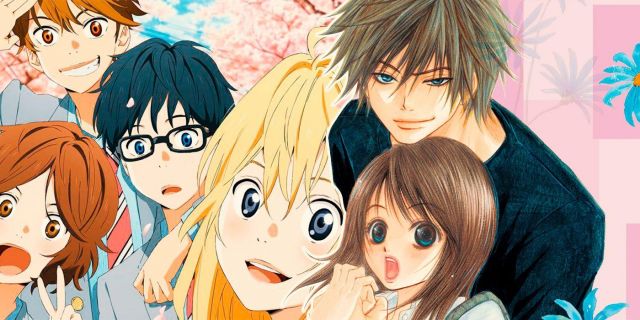Romance is one of the cornerstones of manga storytelling. Even if it’s not the main focus of the plot, many series will feature romance as a sidekick to other themes and a way to propel the story forward. Even One Piece, one of the biggest shonen manga in the world, has side stories of romance interspersed throughout, such as the backstory of Senior Pink and why he dresses like a baby.
There are few mediums that can take readers on an emotional rollercoaster like a romance manga can. For stories that are centralized around romance, that is exactly what the mangaka intends to do. Of course, all readers hope for a happily ever after for the main couple, but sometimes it doesn’t work out that way. Here are some of the best romance manga with bittersweet endings that actually make sense.
Dengeki Daisy Is The Epitome Of Comedy And Great Storytelling

Teru Kurebayashi is a 16-year-old high school student who recently lost her brother, her only remaining relative. Her lone memento of his is a cell phone containing the details of a mysterious person known only as Daisy, who becomes her pillar of support through the dark times. But when circumstances cause her to start working for the school janitor, Tasuku Kurosaki, Teru begins to question Daisy’s true identity.
Dengeki Daisy is a classic example of a shoujo romance manga done right with the perfect amount of comedy interwoven into it’s more serious moments. The characters are incredibly likable and diverse and the story progresses at a pace that seems natural. At the end of it all, the characters have to come to terms with the fact that no matter what mysteries are solved now, the people who have already died will remain dead and all they can do is walk forward.
Fruits Basket Is A Mixed Basket Of Trauma

The orphaned Tohru Honda finds herself taken in by Shigure Sohma when he finds out she has nowhere else to stay. Living in the house with them are her classmates, Yuki and Kyo Sohma. But soon enough, Tohru finds out the Sohma family are hiding a secret. The reason behind their avoidance of women can be explained by something other than a distaste for physical contact.
Fruits Basket was catapulted into mainstream popularity again after the success of the recent anime reboot, which followed the manga’s plotline of the more closely than its 2001 predecessor. Concealed behind a facade of a usual shoujo romance manga, Fruits Basket is a tale of abusive relationships and trauma — and for some characters, healing and closure from it in the end.
Dawn of the Arcana Addresses The Crux of Discrimination & Political Tension

Senan and Belquat are two neighboring countries that have been at war for 200 years. Nakaba, a red-haired princess of Senan, has long known that she is destined to be a sacrificial pawn for her country by getting married to Prince Caesar from Belquat. Accompanied by Loki, her only friend and attendant in this new environment, Nakaba must learn how to survive in this new world where they discriminate against red hair and half-human beings like Loki. But when she foresees events that lead to Prince Caesar’s demise, Nakaba must decide if she wants to save him despite their mutual hatred.
Dawn of the Arcana presents an interesting premise and rarely explored themes of racism in shojo manga. Creator Toma Rei uses a clean and simple art style — characteristic of her works — which makes following the story and the characters a lot easier. The ending is bittersweet because in a divided world where politics and racism are complex, not everyone can win — and some may have to be sacrificed.
The Flower and The Demon Doesn’t Shy Away From The Issue Of Lifespan

In The Flower and the Demon, a demon named Vivi decided to come down to the human world ten years ago and chances upon an abandoned baby girl at his doorstep. On a whim, he decides to keep her and raise her. Now with the 14-year-old Hana around, perhaps the dynamics of their relationship will begin to change.
To a near-immortal demon like Vivi, the lives of humans are transient like the flowers he cannot touch. But through his interactions with Hana, he grows to appreciate the natural beauty of both flowers and humans alike. With such a disparity in lifespan, their love story is bittersweet and bound to come to an inevitable end — but somehow it doesn’t have to represent despair.
Unfortunately, as of this writing The Flower and the Demon currently does not have an official English release but is available to readers who are fluent in Japanese.
Your Lie In April Illustrates The Importance Of Looking Past Despair

Prodigious pianist Kousei Arima can no longer hear the sound of his own piano after his mother’s death. Two years have passed since then and Kousei still lives his life in monotone, unable to see color or touch the piano. Once known as the human metronome, his mother fiercely drilled the instrument’s strict rules into him. A chance encounter with Kaori Miyazaki, a free-spirited violinist, suddenly colors his monotone world with emotions.
At its core, Your Lie in April is a tale about trauma and ultimately healing through the support of people who care. Kousei has been so entrenched in his own despair that until Kaori enters his world, he has never been able to truly see how much his friends, Tsubaki and Watari, care for him. Alas, in a story so fraught with tragedy, the revelation of Kaori’s illness only comes as another hit to the stomach, setting the story up for one of the most devastating yet hopeful endings the anime community has ever known.















Leave a Reply